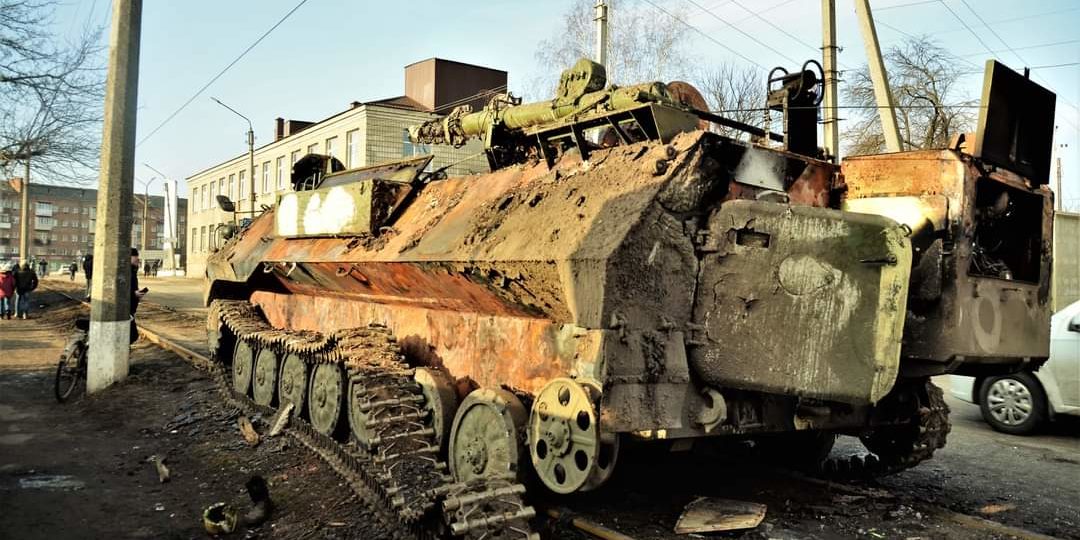When the Cold War ended, early in the 1990s, the biggest mistake the West made was failing to quickly pursue worldwide nuclear disarmament when we had the chance.
Now, we are paying the price.
On Sunday, February 27, Russian President Vladimir Putin placed his country’s nuclear arsenal on high alert. In televised comments, Putin said nuclear readiness was his response to Western support of Ukraine, a country Russia had just invaded.
“Western countries aren’t only taking unfriendly actions against our country in the economic sphere,” Putin said. “But top officials from leading NATO members made aggressive statements regarding our country.”
A few days earlier, as he launched a full-scale attack on Ukraine on multiple fronts, Putin warned other countries against interfering:
“Whoever tries to hinder us, and even more so, to create threats to our country, to our people, should know that Russia’s response will be immediate. And it will lead you to such consequences that you have never encountered in your history.”
From the outset, Putin has not bothered to veil his threat to resort to nuclear weapons. He has been blunt and unambiguous. It seems the Russian leader believes his country could somehow prevail in a nuclear war with the West.
‘Flagrantly and gratuitously flaunting nuclear capacity’
In 2018, Putin boasted that Russia was developing new weapons that could overcome the U.S.’s sophisticated systems for intercepting attacking missiles. At the same time, he touted new, offensive weapons in development.
Those new weapons include a nuclear-propelled cruise missile with unlimited range, and a new, unmanned, nuclear-powered, submarine-type craft.
In response to Putin’s braggadocio, the non-partisan, U.S.-based Arms Control Association warned of a dangerous escalation of Cold War-style rhetoric:
“Responsible leaders do not flagrantly and gratuitously flaunt their country’s capacity to launch nuclear strikes that would inflict catastrophic destruction on a global scale.”
The group also condemned then U.S. president Donald Trump’s determination to increase and enhance his own country’s stockpile of weapons of mass destruction.
“Russia and the United States are heading down a destabilizing and unnecessary path. Both sides are in the process of extraordinarily expensive campaigns to replace and upgrade Cold War nuclear weapons systems at force levels that vastly exceed common sense requirements for nuclear deterrence.”
Putin’s most recent nuclear gambit has encouraged some in the West to do some sabre rattling of their own.
France’s foreign minister, Jean-Yves Le Drian, warned, “I think that Vladimir Putin must also understand that the Atlantic alliance is a nuclear alliance.” And former U.S. general Barry McCaffrey went further. He tweeted:
“Putin saber rattling of a Russian nuclear threat is dangerously escalatory. NOT possible to decapitate the US nuclear deterrent thru a first strike. The US Navy boomers would vaporize Russia. HOW ARE THE RUSSIAN PEOPLE HEARING THIS?”
There was a time when leaders would limit their nuclear brinkmanship to situations where they faced at least the possibility of an actual military attack from their adversaries.
That was the case, at the height of the Cold War, when nuclear weapons and their possible use were at the heart of the Cuban Missile Crisis in 1962.
In that year, the Soviet Union had secretly built offensive nuclear launching sites in Cuba, in part, as a reaction to a failed U.S. invasion of Cuba at the Bay of Pigs in April of 1961.
When U.S. intelligence confirmed the Soviet build-up, the administration of president John F. Kennedy responded with a naval blockade of Fidel Castro’s Cuba. Not wishing that action to be construed as a casus belli the U.S. government described the blockade, euphemistically, as a “quarantine.”
There followed a number of tense days, as U.S. and Soviet officials engaged in a verbal war of insults and accusations. The crisis ended peacefully, partly as a result of a secret promise Kennedy made to remove missiles aimed at the Soviets in their neighbour Turkey, and a period of U.S.-Soviet détente ensued.
But it could have been a lot worse.
During the crisis, a number of senior U.S. officials were willing to risk an actual nuclear war. Among those was the chief of the air force, General Curtis LeMay.
LeMay thought Kennedy’s blockade was a weak response, and wanted to bomb the Soviet missile sites. The result would very likely have triggered an all-out nuclear war, which LeMay and other U.S. military and strategic leaders actually believed the U.S. could win.
LeMay had long advocated for a preemptive U.S. nuclear strike against the Soviets, at a time when the U.S still enjoyed nuclear superiority.
They call it M.A.D. for a reason
The Cold War-era strategic theory of peace through nuclear deterrence was appropriately called M.A.D., which stands for “mutually assured destruction.” The idea was that each side should be capable of destroying the other, which would create a balance of terror and dissuade either side from taking the first step toward war.
Cold War theorists such as Herman Kahn postulated that nuclear weapons would render war unwinnable, ergo unthinkable, ergo obsolete.
If there is any validity to the M.A.D. theory, it has one fundamental flaw. The theory assumes world leaders will be rational actors. If it was not clear before, it should now be obvious that the fate of the Earth — and of humanity — cannot rely on that assumption.
When supporters of Ukraine in Canada argue urgently that we in the West should establish a no-fly zone over Ukraine, they are suggesting we should get into an out-and-out military conflict with Putin. Doing so would be analogous to the U.S. bombing Cuba to destroy Soviet missile bases in 1962. Such a move would have ended in disaster 60 years ago, and it would today.
Appeasement might not be the answer in the current situation. The West will not want to give Putin the opportunity to gloat.
But World War III is not the answer either.



